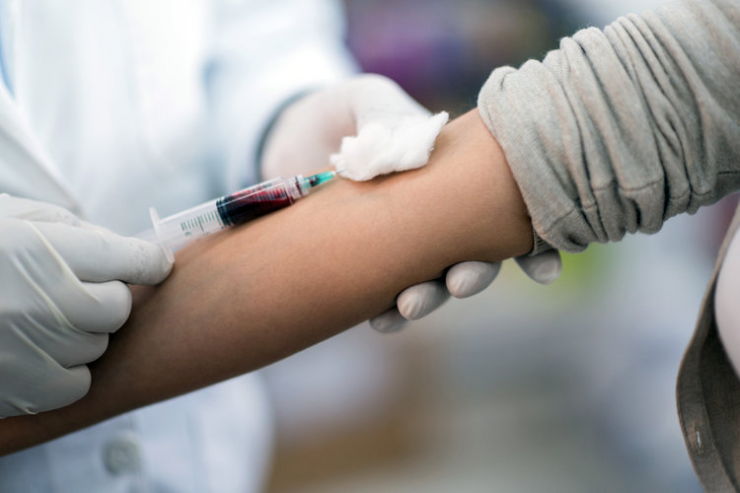
Closely-held CellMax Life has developed FirstSightCRC, the first blood test to identify precancerous adenomas, with accuracy similar to colonoscopies, when prevention of colorectal cancer (CRC) is possible.
“Our CMx platform is optimized to selectively capture and identify precancerous adenomas and cancer cells that are shed into the blood in the lower gastrointestinal tract,” Padma Sundar, VP of strategy and market access, says in an interview with BioTuesdays.
“The only real cure for cancer is finding it early,” Ms. Sundar says, noting that while colonoscopies are the gold standard for colon cancer detection, “compliance in the U.S. is only 38% because it is an invasive test.”
While FirstSight could replace colonoscopy for screening, “we expect the highest adoption [will be] among the 53 million Americans 45 years and older who have never been screened,” Ms. Sundar suggests. This includes 20 million younger individuals who are between the ages of 45 and 50. New guidelines from the American Cancer Society (ACS) now recommend screening for this age group, compared with its previous guidelines to start screening at 50 years of age.
“Colonoscopy will be the confirmatory diagnostic for our test just like it is for other stool and blood-based screening tests,” she adds.

Ms. Sundar explains that the FirstSight liquid biopsy utilizes a patented technology consisting of a microfluidic chip with a proprietary nano layer for cell capture; high-affinity antibodies; a unique biomimetic process to effectively wash away unwanted cells, while retaining circulating tumor cells; and a special air-foam release technology to gently release the captured cells, enabling high intact cell preservation and high detection rates of precancerous cells.
The process also includes algorithms for high throughput image analysis and reproducibility, she adds.
While CRC is the second-leading cause of cancer deaths in the U.S., it is largely preventable with regular screening and treatable with early detection. Screening helps find precancerous polyps, or abnormal growths, so they can be removed before they have a chance to turn into cancer.

According to estimates from the ACS, more than 100,000 new cases of colon cancer and almost 45,000 new cases of rectal cancer will be diagnosed in 2019, with some $14-billion spent on treatment.
Finding and removing precancerous polyps can save lives. According to Ms. Sundar, precancerous adenomas account for more than 90% of actionable colonoscopy findings. A study published in the New England Journal of Medicine in 2012 found that adenoma removal reduced CRC mortality by 53% after a 16-year follow-up of subjects in the study.
At the ASCO Gastrointestinal Cancer Symposium in January, CellMax presented results of a study in Taiwan with 737 adults 50 years of age or older, of which 301 were found to be healthy, 111 had precancerous adenomas and 325 were confirmed to have cancer by colonoscopy or tumor biopsy.
“The test results presented a high accuracy for detecting colorectal cancer, with a close to 90% accuracy for pre-cancer and 95% accuracy for cancer,” Ms. Sundar points out.
In addition to the 53 million people in the U.S. who have never been screened, estimates point to more than 15 million people who use at-home stool tests and 40 million who have colonoscopies. “It is our belief that people would overwhelmingly prefer to take a blood test for CRC screening over a stool test, especially if the blood test offered a high sensitivity to a precancerous condition,” she adds.
The process also includes algorithms for high throughput image analysis and reproducibility, she adds.
While CRC is the second-leading cause of cancer deaths in the U.S., it is largely preventable with regular screening and treatable with early detection. Screening helps find precancerous polyps, or abnormal growths, so they can be removed before they have a chance to turn into cancer.
According to estimates from the ACS, more than 100,000 new cases of colon cancer and almost 45,000 new cases of rectal cancer will be diagnosed in 2019, with some $14-billion spent on treatment.
Finding and removing precancerous polyps can save lives. According to Ms. Sundar, precancerous adenomas account for more than 90% of actionable colonoscopy findings. A study published in the New England Journal of Medicine in 2012 found that adenoma removal reduced CRC mortality by 53% after a 16-year follow-up of subjects in the study.
At the ASCO Gastrointestinal Cancer Symposium in January, CellMax presented results of a study in Taiwan with 737 adults 50 years of age or older, of which 301 were found to be healthy, 111 had precancerous adenomas and 325 were confirmed to have cancer by colonoscopy or tumor biopsy.
“The test results presented a high accuracy for detecting colorectal cancer, with a close to 90% accuracy for pre-cancer and 95% accuracy for cancer,” Ms. Sundar points out.
In addition to the 53 million people in the U.S. who have never been screened, estimates point to more than 15 million people who use at-home stool tests and 40 million who have colonoscopies. “It is our belief that people would overwhelmingly prefer to take a blood test for CRC screening over a stool test, especially if the blood test offered a high sensitivity to a precancerous condition,” she adds.
The process also includes algorithms for high throughput image analysis and reproducibility, she adds.
While CRC is the second-leading cause of cancer deaths in the U.S., it is largely preventable with regular screening and treatable with early detection. Screening helps find precancerous polyps, or abnormal growths, so they can be removed before they have a chance to turn into cancer.
According to estimates from the ACS, more than 100,000 new cases of colon cancer and almost 45,000 new cases of rectal cancer will be diagnosed in 2019, with some $14-billion spent on treatment.
Finding and removing precancerous polyps can save lives. According to Ms. Sundar, precancerous adenomas account for more than 90% of actionable colonoscopy findings. A study published in the New England Journal of Medicine in 2012 found that adenoma removal reduced CRC mortality by 53% after a 16-year follow-up of subjects in the study.
At the ASCO Gastrointestinal Cancer Symposium in January, CellMax presented results of a study in Taiwan with 737 adults 50 years of age or older, of which 301 were found to be healthy, 111 had precancerous adenomas and 325 were confirmed to have cancer by colonoscopy or tumor biopsy.
“The test results presented a high accuracy for detecting colorectal cancer, with a close to 90% accuracy for pre-cancer and 95% accuracy for cancer,” Ms. Sundar points out.
In addition to the 53 million people in the U.S. who have never been screened, estimates point to more than 15 million people who use at-home stool tests and 40 million who have colonoscopies. “It is our belief that people would overwhelmingly prefer to take a blood test for CRC screening over a stool test, especially if the blood test offered a high sensitivity to a precancerous condition,” she adds.
The process also includes algorithms for high throughput image analysis and reproducibility, she adds.
While CRC is the second-leading cause of cancer deaths in the U.S., it is largely preventable with regular screening and treatable with early detection. Screening helps find precancerous polyps, or abnormal growths, so they can be removed before they have a chance to turn into cancer.
According to estimates from the ACS, more than 100,000 new cases of colon cancer and almost 45,000 new cases of rectal cancer will be diagnosed in 2019, with some $14-billion spent on treatment.
Finding and removing precancerous polyps can save lives. According to Ms. Sundar, precancerous adenomas account for more than 90% of actionable colonoscopy findings. A study published in the New England Journal of Medicine in 2012 found that adenoma removal reduced CRC mortality by 53% after a 16-year follow-up of subjects in the study.
At the ASCO Gastrointestinal Cancer Symposium in January, CellMax presented results of a study in Taiwan with 737 adults 50 years of age or older, of which 301 were found to be healthy, 111 had precancerous adenomas and 325 were confirmed to have cancer by colonoscopy or tumor biopsy.
“The test results presented a high accuracy for detecting colorectal cancer, with a close to 90% accuracy for pre-cancer and 95% accuracy for cancer,” Ms. Sundar points out.
In addition to the 53 million people in the U.S. who have never been screened, estimates point to more than 15 million people who use at-home stool tests and 40 million who have colonoscopies. “It is our belief that people would overwhelmingly prefer to take a blood test for CRC screening over a stool test, especially if the blood test offered a high sensitivity to a precancerous condition,” she adds.
Earlier this year, CellMax initiated its Zenith study in the U.S., with the goal of enrolling several hundred patients who are 45 years and older. The study is being done under Institutional Review Board approval to ensure patient safety and privacy.
Prior to undergoing a colonoscopy, subjects will provide a blood sample for a FirstSight test so that results can be compared. The study protocol will group subjects into two categories: negative or healthy; or positive, meaning they are likely to have adenomas or colorectal cancer. Ms. Sundar says the sample sizes will be sufficient to demonstrate sensitivity within each group and specificity for healthy populations.
The primary objective of the Zenith study is detection of precancerous adenomas and CRC, with initial data expected in the second half of 2019. A positive outcome would enable CellMax to commercialize the FirstSight test at its CLIA-accredited lab in Sunnyvale, Calif.
However, Ms. Sundar says that longer term, CellMax may also consider a separate study to seek FDA approval for FirstSight.
“The advantage of FDA approval is that it would allow us to transfer the technology to reference labs around the country to expand usage of FirstSight,” she says. “We’ve had a lot of interest from national reference labs in adding this test to their offering since there is no other blood test for preventative colon cancer screening.”
• • • • •
To connect with CellMax Life, or any of the other companies featured on BioTuesdays, send us an email at editor@biotuesdays.com.







